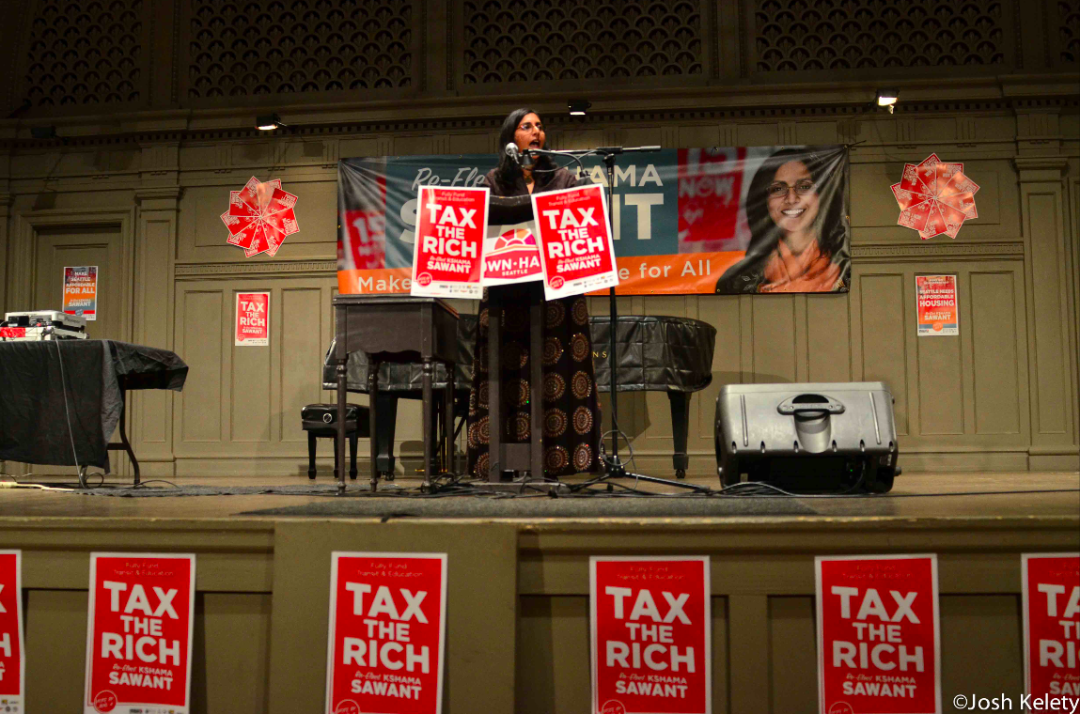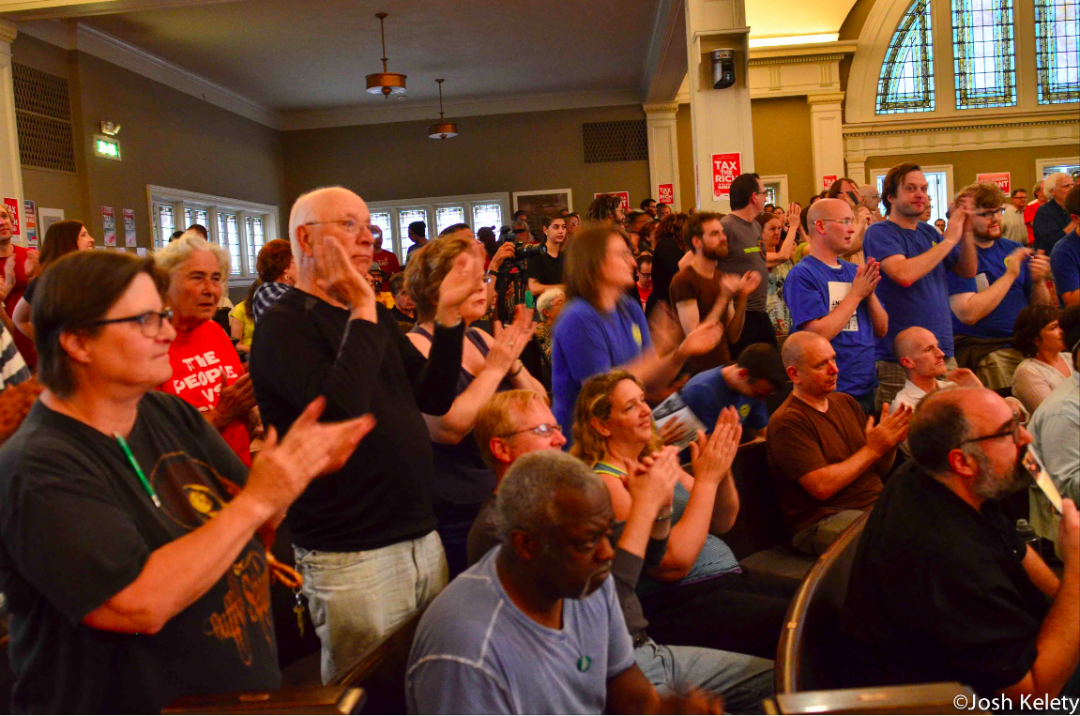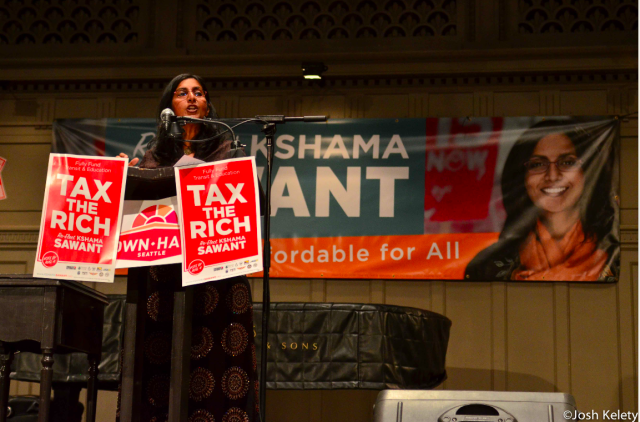Ksha-nomenon Hits Town Hall

1. Around 800 people sweated it at Town Hall on First Hill on Saturday night to cheer Socialist Alternative incumbent city council member Kshama Sawant.
The reelection rally featured fans in red "I'm voting for the Socialist" T-shirts, white rapper RA Scion, and a parade of prominent speakers, including local progressives such as state senator and civil rights leader Pramila Jayapal (D-37, Southeast Seattle) and Service Employees International Union 775 head David Rolf, plus some national lefties—2012 Green Party presidential candidate Jill Stein and writer and journalist Chris Hedges.
There was no shortage of fiery rhetoric. “I'm here to support Kshama because every action that we take now must be to destroy the corporate system of power in all its manifestations,” said Hedges, from a stage plastered with bright red “tax the rich” signs. Hedges is speaking at Town Hall again tonight to promote his new book about income inequality, Wages of Rebellion.

Senator Jayapal ran through a long list of progressive grievances: Washington’s regressive tax system, rising rents, displacement, racially disparate discipline rates in public schools, and the fear that Seattle is “increasingly becoming a white city.” She also called for lifting the state ban on rent control, an issue Sawant is campaigning on this year (it was the subject of Sawant's previous packed city hall rally in April.)
“This is about the movement for justice in a system that is stacked against working people,” Jayapal, the former founder and director of civil rights group OneAmercia said. “Kshama is going to anchor a progressive left on the Seattle City Council and she's going to demand a different vision for our city.”
The prominent speakers and the large turnout (the public also had to fork over $15 to attend) reflected Sawant’s growing popularity and clout. “We should nationalize these victories [Seattle’s $15 minimum wage and Sawant’s election]," Stein told the crowd of mostly, older white people. "We should nationalize these struggles.”

But things got a little weird—and somewhat uncomfortable—when Nicole Grant of the International Brotherhood of Electrical Workers spent over 20 minutes on the mic trying to extract donations from the reluctant audience. Contributions were few and far between, and people quickly got antsy. A fair number sneaked out while some in the back of the venue moaned for Sawant ("Kshama!") to come out already. “This is a chance to make a financial gift that changes the very system of inequality itself,” Grant proclaimed as the crowd cooled themselves with makeshift fans.
As of April's campaign finance reports, Sawant had raised the most money—$81,000—in the race for her District Three spot (from the ship canal to just north of I-90 and from I-5 to Lake Washington). A solid 43 percent of Sawant's contributors, by far the biggest slice, have donated $25 or less. And surely, after Saturday's $15 cover, that percentage is going to skyrocket. Sawant has not reported her May fundraising totals yet.
Her main rival, Urban League leader Pamela Banks, had a strong fundraising month in May, more than doubling the amount she'd raised previously, finishing the month with $91,000 raised (only 6 percent of Banks's contributors were at the $25-or-below mark). Sawant's other main challengers are gay rights leader Rod Hearne (who hasn't reported his latest numbers yet, but had raised nearly $50,000 going into May) and Seattle Women's Commission member Morgan Beach, a gender pay equity advocate who had only raised $10,000 as of May.
Once Sawant finally took the stage (and despite the cast of liberal opponents, including Banks, who told me she supported another premier Sawant issue, an affordable housing tax on developers), Sawant framed both her time on the council and her reelection campaign as a clash between city hall's "loyal servants" of Seattle’s “corporate elite” and Seattle’s working class—represented by her. (Sawant recently moved from Capitol Hill to Leschi where she bought a $345,000 home.)
Sawant, greeted with someone's "We love you Kshama!" shout out when she took the stage ("I love you all too"), appropriately noted her successful push for Seattle’s $15 minimum wage hike and referenced the organizing role she played to head off the Seattle Housing Authority's planned rent hikes; particularly devoted attendees in the crowd shouted out, “Thank you Kshama!”
Sawant's organizing against SHA policy actually continued last week when she helped stop SHA commissioner Nora Gibson, reappointed by then-mayor Mike McGinn in 2012, from getting re-reappointed this time around by current mayor Ed Murray. (Gibson was originally appointed in 2007 by mayor Greg Nickels.)
Gibson ran into opposition after supporting Stepping Forward, a Bill Clinton–esque "welfare reform" style proposal to raise rents and move people out of subsidized housing. Mayor Murray was actually out in front opposing the SHA proposal, in early April 2014. (Along those lines, Sawant's black-and-white version of the world doesn't quite add up. Case in point: Saturday night speaker Pramila Jayapal is a Christian Sinderman candidate. Consultant Sinderman and his roster of clients, which includes Banks, are supposedly the linchpin of the city's establishment.)

But never mind. Sawant is adamant: “The elite see one thing, and they see it clearly. They want this challenge to the status quo to stop,” she told the fervent crowd. “We cannot let them win.”
And she made Mayor Murray (despite his call for 20,000 new affordable housing units) the bad guy.
"So, has the mayor, and the right wing of the council...have they got to work on affordable housing?" (The crowd yelled back, "No!") "Did the mayor press his housing committee to finally come up with something?" (The crowd yelled, "No!") "No. He gave them another month's reprieve. He did respond in a way to our demands," Sawant continued, sarcastically. "He proposed a bill, not to address the housing crisis, but a bill to attack free speech. It was an attempt to send a chilling message to all of us organizing for housing justice." Sawant was referring to a Murray proposal to prevent elected officials from using city hall to campaign for office. (Sawant's electioneering at city hall is currently under investigation by the city's ethics office, though Murray's subsequent proposal to tighten rules against such campaigning was openly ridiculed by the ethics board.)
2. In case you were out the door early on Friday to start soaking in the sunny weekend, be sure to go back and check out Friday afternoon's Jolt—a little PubliCola scoop that Mayor Murray's trip to Israel to speak at a gay rights conference and lead a Seattle trade mission will cost the public a lot more than was originally thought.
We pressed the city into giving us the details that Murray's decision to travel with SPD security in tow added nearly $20,000 to the trip. (SPD's presence on the trip first came to my attention because the officers posted pictures of themselves on Facebook.)
The Seattle Times added details to our story, reporting that the Seattle Fire Department was spending another $10,000 to $12,000 to participate in the trade mission, meeting with Israeli emergency medical service workers.
3. Speaking of this weekend: If you rode the bus on Saturday or Sunday and were startled—and then annoyed—by the loud and persistent loop of intercom messages about safety, surveillance footage, and standing behind the yellow line (though, the range of languages was cool), you weren't alone.
This just in from King County Metro:
In an effort to promote safety on buses, Metro on Saturday introduced a series of public service announcements on buses, only to find that there were customer and employee concerns with them, including their volume and frequency. Additional information is available on the Metro Matters blog, accessible on Metro Online.
In response to customer and employee feedback, Metro is working to remove the announcements prior to the Monday commute. While it is expected that most of the announcements will be removed prior to Monday morning, it is possible that they may still be live on a few coaches. Bus drivers do not have control of the announcements, but Metro staff will work to resolve any remaining instances as quickly as possible.
With reporting by Josh Kelety




